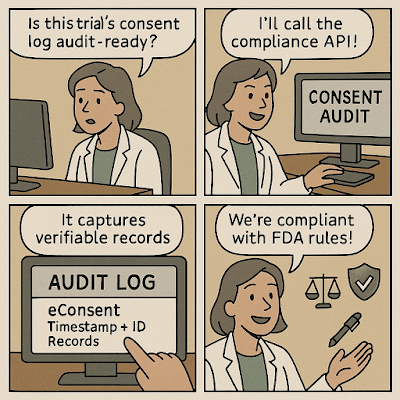Consent Audit APIs for Clinical Trial Protocols: HIPAA + 21 CFR Part 11
In the age of decentralized trials and digital consent forms, ensuring regulatory-compliant consent capture has become one of the most mission-critical steps in running clinical studies.
Failure to maintain accurate, time-stamped, and tamper-proof consent logs exposes research sponsors, CROs, and trial sites to enormous risks—both legally and ethically.
This is why Consent Audit APIs are fast emerging as the compliance backbone of modern clinical trials, enabling traceable, audit-ready records aligned with HIPAA and FDA 21 CFR Part 11 requirements.
📌 Table of Contents
- HIPAA and 21 CFR Part 11 Consent Requirements
- What Consent Audit APIs Do
- Key Compliance Features of These APIs
- Operational Benefits for Clinical Teams
- Best Practices for Integration and Validation
HIPAA and 21 CFR Part 11 Consent Requirements
Clinical trial consent protocols must align with two primary compliance pillars:
✔️ HIPAA: Requires the safeguarding of Protected Health Information (PHI), audit trails of disclosures, and informed patient rights disclosures.
✔️ 21 CFR Part 11: Mandates electronic record integrity, signature verification, system validation, and audit trails that can withstand FDA inspections.
Traditional paper-based consent workflows, or even fragmented eConsent tools, fall short of delivering consistent, real-time auditable visibility—especially in multi-site or remote trials.
What Consent Audit APIs Do
Consent Audit APIs serve as middleware between eConsent platforms and regulatory systems, offering programmatic access to verifiable consent logs and event timelines.
✔️ Capture timestamps, identity markers, and versioned consent documents
✔️ Generate machine-readable audit logs per subject
✔️ Track version changes to protocols and re-consent events
✔️ Trigger alerts for missing, revoked, or incomplete consent records
Key Compliance Features of These APIs
✔️ Support for digital signatures, biometrics, and multi-factor verification
✔️ Encryption at rest and in transit (TLS 1.2+)
✔️ Role-based access for IRBs, PIs, coordinators, and auditors
✔️ Real-time event logs with immutable blockchain or hash integrity (optional)
✔️ Exportable audit trails for FDA and sponsor audits
Operational Benefits for Clinical Teams
✔️ Automates re-consent validation during protocol amendments
✔️ Reduces risk of invalidated data due to improper consent capture
✔️ Improves trial start-up time with pre-configured API templates
✔️ Enhances transparency across trial sites and sponsors
Best Practices for Integration and Validation
✔️ Validate the API with test subjects under Part 11 validation SOPs
✔️ Integrate with eConsent apps and EDCs using secure API gateways
✔️ Align with sponsor and CRO document management systems (eTMF)
✔️ Include consent record endpoints in trial readiness checklists
✔️ Conduct quarterly audits and penetration tests on data handling logic
🔗 Related Resources
Blockchain Timestamping for Consent Validation
AI Auditors for Clinical Data Integrity
Equity-Based Collateral for Health Data IP
LLC Structures for Clinical Data Licensing
Dividend Strategies for Life Sciences SaaS
With Consent Audit APIs, clinical trial teams can future-proof their compliance while building trust with regulators, sponsors, and patients.
Keywords: consent audit API, HIPAA eConsent, 21 CFR Part 11 SaaS, clinical trial compliance, digital informed consent






